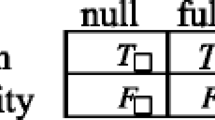Abstract
We study the coinductive formulation of common knowledge in type theory. We formalise both the traditional relational semantics and an operator semantics, similar in form to the epistemic system S5, but at the level of events on possible worlds rather than as a logical derivation system. We have two major new results. Firstly, the operator semantics is equivalent to the relational semantics: we discovered that this requires a new hypothesis of semantic entailment on operators, not known in previous literature. Secondly, the coinductive version of common knowledge is equivalent to the traditional transitive closure on the relational interpretation. All results are formalised in the proof assistants Agda and Coq.
Access this chapter
Tax calculation will be finalised at checkout
Purchases are for personal use only
Similar content being viewed by others
References
Barwise, J.: Three views of common knowledge. In: Vardi, M.Y. (ed.) Proceedings of the 2nd Conference on Theoretical Aspects of Reasoning about Knowledge, Pacific Grove, CA, March 1988, pp. 365–379. Morgan Kaufmann (1988)
Bertot, Y., Castéran, P.: Interactive Theorem Proving and Program Development. Coq’Art: The Calculus of Inductive Constructions. Springer, Heidelberg (2004). https://doi.org/10.1007/978-3-662-07964-5
Blackburn, P., de Rijke, M., Venema, Y.: Modal Logic. Cambridge University Press, New York (2001)
Bucheli, S., Kuznets, R., Struder, T.: Two ways to common knowledge. Electron. Notes Theor. Comput. Sci. 262, 83–98 (2010)
Capretta, V.: General recursion via coinductive types. Log. Methods Comput. Sci. 1(2), 1–18 (2005). https://doi.org/10.2168/LMCS-1(2:1)2005
Capretta, V.: Common knowledge as a coinductive modality. In: Barendsen, E., Geuvers, H., Capretta, V., Niqui, M. (eds.) Reflections on Type Theory, Lambda Calculus, and the Mind, pp. 51–61. ICIS, Faculty of Science, Radbout University Nijmegen (2007). Essays Dedicated to Henk Barendregt on the Occasion of his 60th Birthday
Coquand, T.: Infinite objects in type theory. In: Barendregt, H., Nipkow, T. (eds.) TYPES 1993. LNCS, vol. 806, pp. 62–78. Springer, Heidelberg (1994). https://doi.org/10.1007/3-540-58085-9_72
Fagin, R., Halpern, J.Y., Vardi, M.Y., Moses, Y.: Reasoning About Knowledge. MIT Press, Cambridge (1995)
Gamow, G., Stern, M.: Puzzle Math. Viking Press, New York (1958)
Garson, J.: Modal logic. In: Zalta, E.N. (ed.) The Stanford Encyclopedia of Philosophy. Metaphysics Research Lab, Stanford University (2016)
Giménez, E.: Codifying guarded definitions with recursive schemes. In: Dybjer, P., Nordström, B., Smith, J. (eds.) TYPES 1994. LNCS, vol. 996, pp. 39–59. Springer, Heidelberg (1995). https://doi.org/10.1007/3-540-60579-7_3
Hintikka, J.: Knowledge and Belief. Cornell University Press, Ithaca (1962)
Keller, C., Werner, B.: Importing HOL light into Coq. In: Kaufmann, M., Paulson, L.C. (eds.) ITP 2010. LNCS, vol. 6172, pp. 307–322. Springer, Heidelberg (2010). https://doi.org/10.1007/978-3-642-14052-5_22
Kripke, S.A.: A completeness theorem in modal logic. J. Symb. Logic 24(1), 1–14 (1959)
Lescanne, P.: Common knowledge logic in a higher order proof assistant. In: Voronkov, A., Weidenbach, C. (eds.) Programming Logics. LNCS, vol. 7797, pp. 271–284. Springer, Heidelberg (2013). https://doi.org/10.1007/978-3-642-37651-1_11
Lewis, C.I., Langford, C.H.: Symbolic Logic. The Century Co., New York (1932)
Reynolds, J.C.: User-defined types and procedural data structures as complementary approaches to data abstraction. In: Gries, D. (ed.) Programming Methodology. MCS, pp. 309–317. Springer, New York (1978). https://doi.org/10.1007/978-1-4612-6315-9_22
Author information
Authors and Affiliations
Corresponding author
Editor information
Editors and Affiliations
Rights and permissions
Copyright information
© 2018 Springer International Publishing AG, part of Springer Nature
About this paper
Cite this paper
Baston, C., Capretta, V. (2018). The Coinductive Formulation of Common Knowledge. In: Avigad, J., Mahboubi, A. (eds) Interactive Theorem Proving. ITP 2018. Lecture Notes in Computer Science(), vol 10895. Springer, Cham. https://doi.org/10.1007/978-3-319-94821-8_8
Download citation
DOI: https://doi.org/10.1007/978-3-319-94821-8_8
Published:
Publisher Name: Springer, Cham
Print ISBN: 978-3-319-94820-1
Online ISBN: 978-3-319-94821-8
eBook Packages: Computer ScienceComputer Science (R0)




